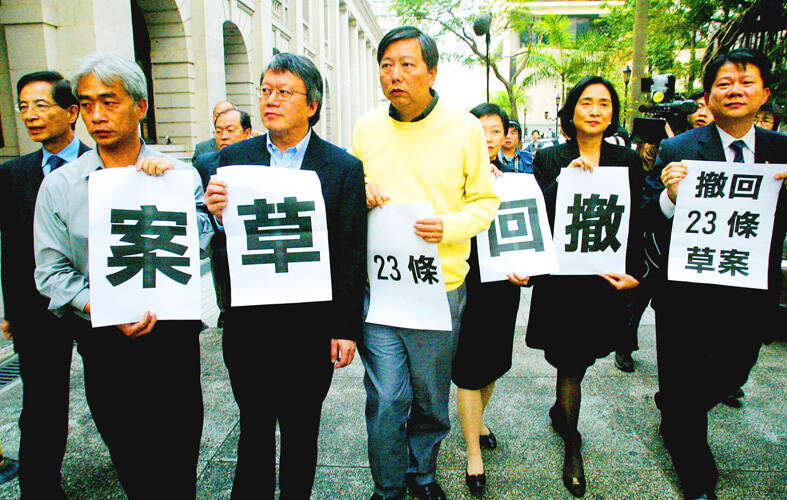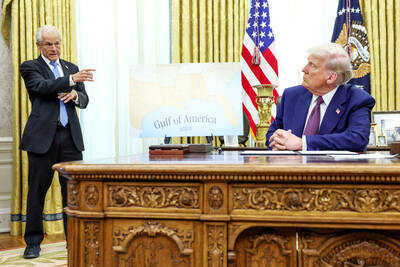Under heavy skies, the minibus carrying Hong Kong politician Emily Lau (劉慧卿) rattles along a winding mountain road to Stanley Prison for a visit she finds all too familiar.
Lau is the former chair of the Democratic Party, once the city’s stalwart opposition force, but now seatless and preparing to dissolve as some of its veterans languish in jail.
The party and its campaign for freer elections have withered under Beijing’s years-long national security crackdown. After the 2019 protests paralyzed the financial hub, Beijing moved to further restrict elections and imprison democracy campaigners.

Photo: AP
Lau listed five party comrades behind bars, including her predecessor Albert Ho (何俊仁), who could be jailed for life on national security charges.
Ho is “very, very patriotic,” she said ahead of her visit to Stanley Prison. “Look at his fate.”
The remaining members of the city’s main democracy party yesterday voted to proceed with plans to shut down, following procedures that began in February.

Photo: Reuters
At the time, party chair Lo Kin-hei (羅健熙) cited the “political environment,” but refused to say if there had been pressure from Beijing to dissolve.
Hong Kong’s Democratic Party was founded in 1994, three years before the British colony was handed over to China.
Its top concern was determining how the city would eventually elect its own leader and lawmakers through universal suffrage as promised in China’s “one country, two systems” model.
Lee Wing-tat (李永達), a founding member, was among those inspired to enter politics by Beijing’s pledge of “Hong Kong people ruling Hong Kong.”
“When I got older I found out those slogans were fake, but it’s hard to blame a young man in his twenties for being idealistic,” said Lee, who now lives in the UK.
The party’s manifesto supported the 1997 handover and acknowledged Hong Kong as part of China, a tone set by heavyweights Szeto Wah (司徒華) and Martin Lee (李柱銘).
Interviewees recalled the two leaders as yin and yang: Szeto a po-faced strategist with patriotic roots, Lee a suave barrister dubbed the city’s “father of democracy.”
The party’s moderate line meant that, for a time, it was “relatively easy” to communicate with Beijing, founding member Sin Chung-kai (單仲偕) said.
In 2010, the party decided to send three members, including Emily Lau, to meet with Beijing’s representatives in Hong Kong to discuss electoral reform.
“That was the first time and the only time that Beijing decided to negotiate with us,” Lau said.
“We said to the liaison officers, ‘Well, you must continue to talk to us,’ but they never did,” she said.
The 2010 meeting was divisive.
Critics accused the Democratic Party of selling out at a time when smaller, more radical groups were emerging in the opposition camp.
Within the party, younger members called for a more assertive stance, said Ted Hui (許智?), who won his first seat in 2011.
Hui saw a need to “break the rules of the game” in order to secure real democratic reform.
One early protest, which ended with him being tossed out of a District Council meeting, gained public sympathy, but was considered “impulsive” by party elders.
“The party needed a more comprehensive transformation, so it can move in sync with society,” he said. “We had to up our game.”
By the time the massive democracy protests seized Hong Kong in 2019, Hui and other party figures had learned to tread a fine line, playing a peaceful yet defiant role during street clashes.
The party more than doubled its seats at the District Council that year on swelling anti-government sentiment.
However, a Beijing-imposed national security law in 2020 was the beginning of the end.
Authorities used that law to jail four Democratic Party former lawmakers, saying they were among 47 opposition figures who took part in an informal primary election to subvert state power.
Hui, who moved to Australia, was also accused of breaching the security law and became the target of a police bounty.
The Democratic Party holds no elected seats after its lawmakers resigned en masse in 2020 to protest Beijing’s tightened grip.
The wipeout was repeated at District Councils the following year.
Ramon Yuen (袁海文), a former party treasurer, said members were sometimes treated like outcasts — restaurants refused to host their banquets.
“Even normal social gatherings could not be held,” he said.
Yuen said he was in favor of dissolution and expected most of the 400 party members to agree.
“Hong Kong has discussed [universal suffrage] for so many years, but regrettably we don’t know when we’ll see it,” he said.
Outside Stanley Prison, Lau said she makes regular visits to let jailed democrats know “they have not been forgotten.”
The party’s end should spur the public to ask hard questions, she added.
“Why do we have to disband? What is going on? That’s a question I want Hong Kong people to ask,” she said.

‘EYE FOR AN EYE’: Two of the men were shot by a male relative of the victims, whose families turned down the opportunity to offer them amnesty, the Supreme Court said Four men were yesterday publicly executed in Afghanistan, the Supreme Court said, the highest number of executions to be carried out in one day since the Taliban’s return to power. The executions in three separate provinces brought to 10 the number of men publicly put to death since 2021, according to an Agence France-Presse tally. Public executions were common during the Taliban’s first rule from 1996 to 2001, with most of them carried out publicly in sports stadiums. Two men were shot around six or seven times by a male relative of the victims in front of spectators in Qala-i-Naw, the center

Canadian Prime Minister Mark Carney is leaning into his banking background as his country fights a trade war with the US, but his financial ties have also made him a target for conspiracy theories. Incorporating tropes familiar to followers of the far-right QAnon movement, conspiratorial social media posts about the Liberal leader have surged ahead of the country’s April 28 election. Posts range from false claims he recited a “satanic chant” at a campaign event to artificial intelligence (AI)-generated images of him in a pool with convicted sex offender Jeffrey Epstein. “He’s the ideal person to be targeted here, for sure, due to

DISPUTE: Beijing seeks global support against Trump’s tariffs, but many governments remain hesitant to align, including India, ASEAN countries and Australia China is reaching out to other nations as the US layers on more tariffs, in what appears to be an attempt by Beijing to form a united front to compel Washington to retreat. Days into the effort, it is meeting only partial success from countries unwilling to ally with the main target of US President Donald Trump’s trade war. Facing the cratering of global markets, Trump on Wednesday backed off his tariffs on most nations for 90 days, saying countries were lining up to negotiate more favorable conditions. China has refused to seek talks, saying the US was insincere and that it

As Elon Musk called one of US President Donald Trump’s top economic aides a “moron,” the White House on Tuesday declared that “boys will be boys.” Musk and long-time Trump trade adviser Peter Navarro have been squabbling publicly over Trump’s decision to impose sweeping tariffs on most of its trading partners. The move has triggered a market sell-off and prompted analysts to wonder if the US is headed into a recession. “Look, these are obviously two individuals who have very different views on trade and on tariffs,” White House press secretary Karoline Leavitt said. “Boys will be boys, and we